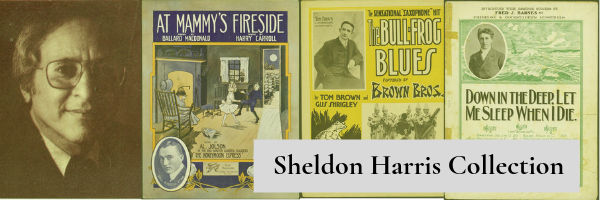
Sheet Music, 1900-1909
Preview

Files
Download Full Text (8.6 MB)
ISBN
MUM00682, 0576
Description
Cover: drawing of three African American male faces; photo inset of Irving Jones; text reads: The most successful song hit of 1901. As introduced and sung by Lew Dockstader.; Publisher: Sol Bloom (Chicago)
Subject Headings (Library of Congress)
Songs -- United States -- 20th Century; Popular Music -- United States
Relational Format
music score
Original Format
scores
Original Collection
Sheldon Harris Collection (MUM00682), Archives and Special Collections, University of Mississippi Libraries
Finding Aid
Lyrics
Lyrics:
First verse
Although it's not my color. I'm feeling mighty blue; I've got a lot of trouble, I'll tell it all to you; I'm certainly clean disgusted With life and that's a fact. Because my hair is woolly And because my color's black. My gal, she took a notion Against the colored race, She said if I would win her I'd have to change my face; She said if she should wed me, That she'd regret it soon, And now I'm shook, yes, good and hard, Because I am a coon
Refrain
Coon! Coon! Coon! I wish my color would fade; Coon! Coon! Coon! I'd like a different shade Coon! Coon! Coon! Morning, night and noon, I wish I was a white man Stead of a Coon! Coon! Coon! Coon! Coon! Coon! I wish my color would fade; Coon! Coon! Coon! I'd like a different shade Coon! Coon! Coon! Morning, night and noon, I wish I was a white man Stead of a Coon! Coon! Coon!
Second verse
I had my face enameled, I had my hair made straight, I dressed up like a white man, And cert'nly did look great; Then started out to see her, Just shortly after dark, But on the way to meet my babe I had to cross a park; Just as I was a-thinking I had things fixed up right, I passed a tree where two doves Sat making love at night; They stopped and looked me over, I saw my finish soon, When both those birds said good and loud, Coo-oo-oo-oo-oo-oon.
(Refrain)
Content Disclaimer
Some of the images and language that appear in the digital collections depict prejudices that are not condoned by the University of Mississippi. This content is being presented as historical documentation to aid in the understanding of both American history and the history of the University of Mississippi. The University Creed speaks to our current deeply held values, and the availability of this content should not be taken as an endorsement of previous attitudes or behavior.


